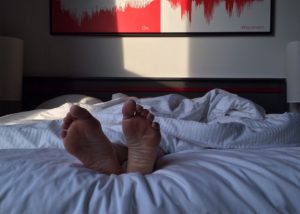How Sleep Loss Is Causing You To Gain Weight.
A Texarkana Chiropractor Discusses Two Of The Most Common Problems Facing Texarkana Residents… Sleep Loss and Weight Gain.
In several studies, short sleep time has been associated with being overweight and obesity.
In persons sleeping less than 8 hours (most people), increased Body Mass Index has been shown to be proportional to decreased sleep.
In other words the less you sleep, the more you weigh.
Many potential possibilities exist, including that there is a common cause of both weight gain and sleep loss… but there is certainly more to it than initially meets the eye.
Certainly being overweight contributes to poor sleep quality through a variety of mechanisms including:
- Increasing structural stress thereby increasing pain in the back and other areas.
- Increases sleep pathology like sleep apnea that reduces sleep quality.
- Reduced ability and energy to exercise which has been shown to help sleep quality.
The question is…
Why Does Sleep Loss Cause Weight Gain?
We have several mechanisms that I’ll briefly talk about below.
Lack of sleep disrupts hormone levels, making you feel hungry even when your body doesn’t need food.
We’ll get to the hormonal shift momentarily.
Let’s see how sleep loss effects some other behavior that interferes with sleep and causes you to gain weight first.
Loss of sleep frequently causes people to load up on some caffeine often coupled with a huge dose of sugar at your favorite coffee shop on the way to work so that you don’t end up face first on your desk before mid-morning.
This does help keep you up for a while before the inevitable sugar and caffeine crash.
This often leads to some other doses of coffee as the day progresses to help keep you awake.
Depending on your body, it can take 12 hours to get rid of most of the caffeine.
This means that the caffeine may still be present as you try to sleep that evening. This further disrupts sleep.
You make it through the day.
You’re so tired you head straight home for dinner. You’re far too tired to go for a walk, let alone make a trip to the gym.
You exercise less, understandably so because you’re too tired to make it happen even though you know it’s a good idea.
What Happens Hormonally With A Loss Of Sleep?
A study, Short Sleep Duration Is Associated with Reduced Leptin, Elevated Ghrelin, and Increased Body Mass Index, looked at various hormone levels associated with sleep loss and it’s effect on body mass index (how much people weight by their height).
Participants with sleep loss had reduced leptin and elevated ghrelin.
These hormones help regulate appetite.
- Ghrelin increases your appetite, making you more likely to eat more
- Leptin suppresses appetite, so you’ll stop eating while also increasing energy expenditure.
The changes shown in sleep deprivation increase your appetite and reduce your ability to use energy.
Other studies have demonstrated higher night time cortisol levels in sleep deprived individuals.
Cortisol is a stress hormone that reduces sleep if elevated at night.
It does have other effects as well.
Chronic elevations of evening cortisol levels in chronic sleep loss is likely to cause greater insulin resistance, a risk factor for obesity and diabetes.
Changes in thyroid hormone also occur in chronic sleep loss which slow down your metabolism making it more likely you gain weight.
It should be mentioned that these changes occur in kids, teenagers, and adults.
Everyone is at risk, regardless of age.
Other Metabolic Changes Occur When We Leave Sleep
Other changes occur as well including changes in Growth Hormone Release which increases problems with glucose tolerance.
Increased blood sugar and insulin responses have been shown which increase the odds of type 2 diabetes and weight gain, as well as, a host of other very serious health problems.
We talked a lot about the hormonal problems of sleep loss above with so many things going on that cause people to eat more and expend less energy… both of which can lead to weight gain and a variety of health problems.
What Causes Sleep Loss and What Can You Do About It?
The most common cause of sleep loss and poor sleep quality is pain.
If you can’t seem to get a good night’s sleep, I have some good news.
Chiropractic is very likely the solution to your pain that is causing your loss of sleep and many people experience immediate sleep improvement with Chiropractic Care.
In a recent study of 221 chiropractic patients, one-third of the subjects who completed the required interview reported immediate effects on their sleep after a chiropractic adjustment. From this group of responders, a whopping 98% recorded improved results with chiropractic versus those whose sleep patterns did not get better.
See A Texarkana Chiropractor
Short Sleep Duration Is Associated with Reduced Leptin, Elevated Ghrelin, and Increased Body Mass Index
Shahrad Taheri, 1 ,¤ Ling Lin, 1 Diane Austin, 2 Terry Young, 2 and Emmanuel Mignot 1 ,*
PLoS Med. 2004 Dec; 1(3): e62. Published online 2004 Dec 7. doi: 10.1371/journal.pmed.0010062. PMCID: PMC535701
Insomnia and Sleep Health Expert Column. The Impact of Sleep Deprivation on Hormones and Metabolism
Authors: Eve Van Cauter, PhD; Kristen Knutson, PhD; Rachel Leproult, PhD; Karine Spiegel, PhD. https://www.medscape.org/viewarticle/502825
Insomnia: does chiropractic help?
J Manipulative Physiol Ther. 2005 Mar-Apr;28(3):179-86. Jamison JR1. https://www.ncbi.nlm.nih.gov/pubmed/15855906
 Protected by Patchstack
Protected by Patchstack
Leave a Reply